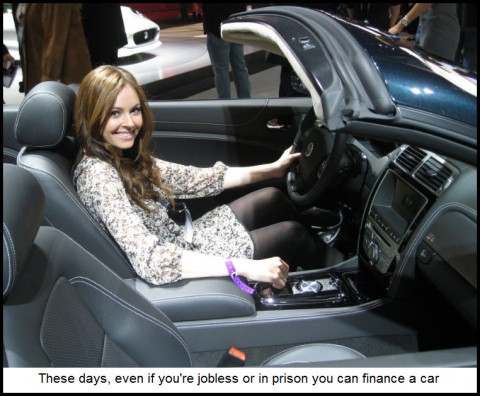Here’s a perplexing new twist in the story of America’s supposed recovery from The Great Recession. While auto manufacturers can barely keep up with demand, sales at Wal-Mart, Macy’s and some other big retailers have gone flat. What’s going on here? The easy explanation is that auto showrooms attract a different class of shopper, one with more discretionary income. Our take, however, is that more than a few Wal-Mart shoppers who have cut back on non-essential purchases are in fact driving shiny new SUVs.
While this might seem paradoxical, there’s a simple explanation – namely, that even households that don’t have two nickels to rub together at the end of the month can easily qualify for a $40,000, five-year car loan. With interest rates as low as they are, especially for big-ticket items purchased on credit, the buy-now- pay-later engine of the U.S. economy is able to thrive even with real incomes stagnant and new employment coming mainly from minimum-wage jobs.
The Question of the Week is: What’s your take on the recovery? Is it about to come to a screeching halt? Did it ever really begin? Will the economy ever return to “normal,” whatever that means? Are college grads doomed to live with their parents until they are 35 or older, like they do in Spain? Anecdotes drawn from personal experience and the lives of friends and neighbors are welcome.


Totally fictitious recovery since 2009, and a stock market which since that year has been soaring so steeply that according to Gann Global (they keep the largest database of 200 year market stats in North America) is now already in the ultra-elite group of 4-5 largest and fastest stock bull markets in 3 centuries … and appears to be closing in on the No. 1 spot next year. They (and others) forecast the bull trend continuing up till we see S&P 3600 and a DOW north of 20,000 – 25,000. These are the bull markets that fool all rational observers – once in a generation bull runs that had no rational basis to exist. The Gann system is powerful. And there are others who forecast it as much as five years ago also. David Bensimon of Polar Pacific out in Singapore was one. Like the Gann group, he spent a decade meticulously reconstructing global markets spanning three centuries. I read around, subscribe to absolutely no group or school, and look for market observers who employ large databases of market history, or who work on discerning the really big macro trends. Cannot absolutely abide day trading, scalping, or any kind of trading. Give me an analyst who has a great track record of making only a few major calls on the indexes say once every two to five years. They call the big direction – up, down or sideways for a good long stretch. Those are the people I get interested in. And the point is, you look for two or three of the best of these, to see **what they agree on** – then you’ve found a high probability macro trend. What I was reading from the likes of Gann Global and David Bensimon five years ago called for a major, multi year, massive inflationary bull run. It’s understood the economic recovery is fictitious, and that our standard of living is crumbling badly. But the actionable insight was, that in an all-fiat currency world, you will never see hyperinflation – nor will you see real deflation – you will see a curious economic disintegration in the Western economies, along with burgeoning growth in the industrializing world, and the STOCK MARKETS and COMMODITY MARKETS, act as the pressure relief valve to adjust asset valuations upwards as the currencies engage in ever steepening competitive devaluations. This process has been led, since 2009, by the USD equities zone. In a 20 year process of fiat currency paradigm disintegration, it is the peripheral currencies which will be thrown under the bus first. The senior currency does not go under the bus until last. So the Peter Schiff’s of our world (who lost his clients a bundle of money in 2008), keep encouraging them to play the wrong cards – convinced the emerging currencies are to soar, and the USD collapse. Instead the past five years have taught them a harsh lesson as the USD rains remarkably firm (and IMO will get a lot firmer yet – up to 90 on the USD index), and while they watch in pained bemusement, as the US indexes soar and emerging market indexes get torn to shreds. Several of these analysts called this for a major bull run back in 2007-2009. A 5-7 year run that may top the three hundred year records. This is why equating a collapsing substrate of the econy with a collapsing stock market is naive in the context of an all fiat currency world.